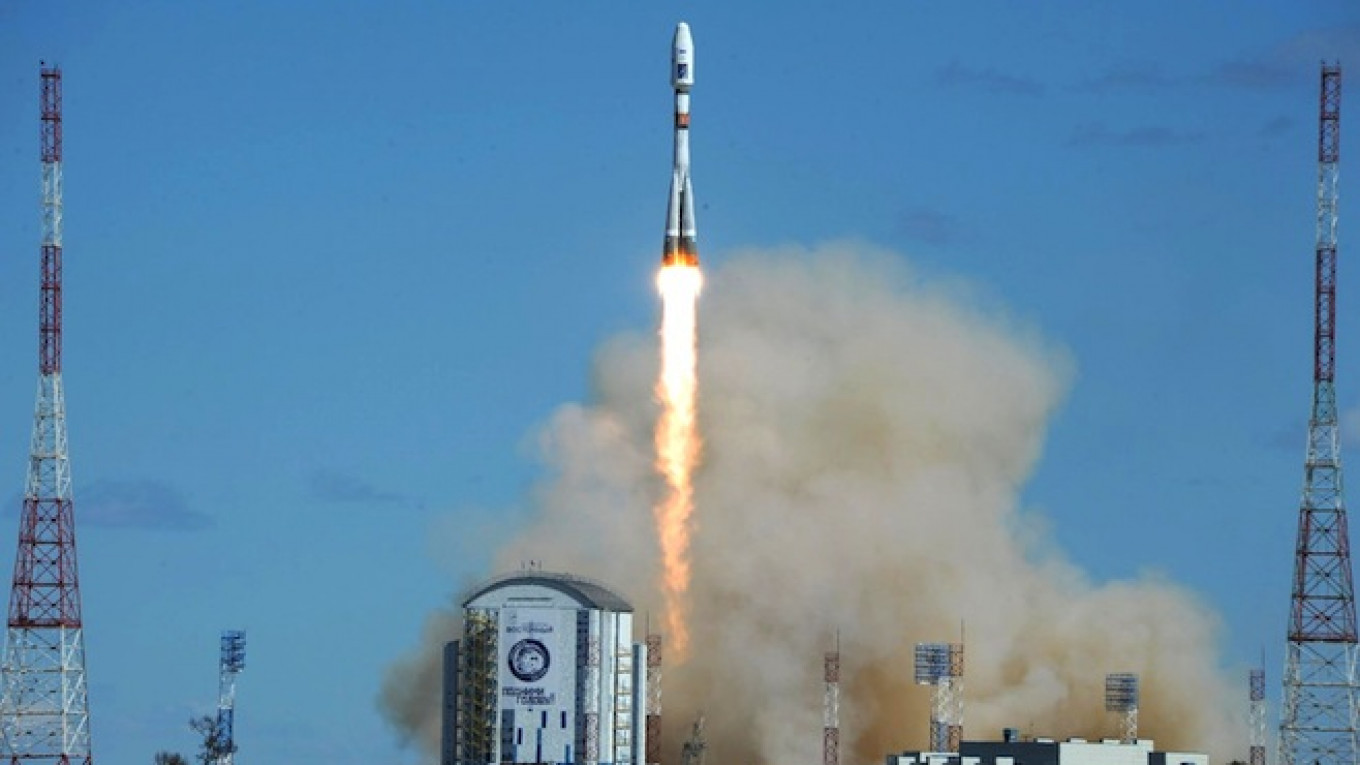Russia launched the first rocket from the new Vostochny Cosmodrome on Thursday, a day after a first attempt was aborted due to a last minute technical failure.
"We have something to be proud of," said President Vladimir Putin after watching the Soyuz 2.1a rocket blaze from the cosmodrome near Russia's far eastern border with China. "This is undoubtedly a major step in the development of Russian cosmonautics," he added, according to a transcript on the Kremlin's website.
Roscosmos, the Russian state space corporation, said three scientific research satellites on the rocket had been safely placed into orbit.
The successful launch came 24 hours after a first attempt was halted by an automated control system 90 seconds before liftoff.
That failure caused some soul searching from Putin, who warned that while technical errors do happen, "if these glitches are the result of sloppy work or a lack of proper oversight, I want to understand what happened … [and] make conclusions."
The launch, the first from Vostochny, was a symbolic event of Russia's resurgence in space. Putin traveled almost 6,000 kilometers from Moscow to witness it.
Putin officially reprimanded three top officials responsible for the country's space sector following the failed launch on Wednesday, the Kommersant newspaper reported. These included Roscosmos chief Igor Komarov, Deputy Prime Minister Dmitry Rogozin, who oversees the aerospace sector, and Leonid Shalimov, a space industry executive.
The rebukes are not the first to be handed down over Vostochny. The cosmodrome has been plagued with delays, embezzlement scandals and workforce strikes due to unpaid wages since construction began in 2012. President Putin promised to take personal control of the project, while Deputy Prime Minister Rogozin vowed to "rip the heads off" saboteurs. The planned first launch date in late 2015 was still missed.
Carved into 700 square kilometers of Siberian forest with a budget of between $4 billion and $6 billion, the cosmodrome is meant to boost the economy of the sparsely-populated Far East. It will also reduce Russia's dependence on Baikonur, the Soviet-era cosmodrome located on the Kazakh steppe and leased by Moscow for $115 million a year.
Vostochny currently has one launch platform for the Soyuz, a rocket design that dates from the 1960s. A more technically challenging launch pad for the Angara, Russia's first post-Soviet rocket, will be complete only after 2020.
When finished, Vostochny will be criss-crossed with 115 kilometers of road and 125 kilometers of railway track, all linking multiple launch platforms, testing and assembly sites, cosmonaut training facilities and a town of 40,000 scientists, engineers and their families.
The contrast to the Soviet Baikonur is striking. Vostochny is 10 times smaller and far less militarized, with less infrastructure buried underground to withstand attack. Its focus is on commercial launches, a segment of the space industry where Russia currently has around 40 percent market share and earns hundreds of millions of dollars each year.
Komarov, the Roscosmos chief, appeared optimistic when he appeared in a corporate video 10 days before the launch. He said students at Russian universities had helped Roscosmos to build the scientific equipment on board the Soyuz rocket, adding: "We see in them our big future."
But storm clouds are gathering over Russia's cosmic industries. In the United States, Elon Musk's SpaceX is pushing ahead with reusable rockets that could soon be far cheaper than Russian models. Russian government funding plans have more than halved since the economy entered recession after 2014. Moscow will spend 1.4 trillion rubles ($21 billion) on the space program over the next decade — around one-tenth of U.S. space subsidies. And since 2010, Russia has seen a series of spectacular launch failures over a variety of rocket designs, throwing the health of the entire industry into question.
Russia's response has been to bring its entire space industry under the umbrella of Komarov's state corporation. Some 200,000 Russians now work in the space sector, down from more than a million in the Soviet era.
Only time will tell whether Roscosmos and its huge new cosmodrome can keep the country's space ambitions alive.
A Message from The Moscow Times:
Dear readers,
We are facing unprecedented challenges. Russia's Prosecutor General's Office has designated The Moscow Times as an "undesirable" organization, criminalizing our work and putting our staff at risk of prosecution. This follows our earlier unjust labeling as a "foreign agent."
These actions are direct attempts to silence independent journalism in Russia. The authorities claim our work "discredits the decisions of the Russian leadership." We see things differently: we strive to provide accurate, unbiased reporting on Russia.
We, the journalists of The Moscow Times, refuse to be silenced. But to continue our work, we need your help.
Your support, no matter how small, makes a world of difference. If you can, please support us monthly starting from just $2. It's quick to set up, and every contribution makes a significant impact.
By supporting The Moscow Times, you're defending open, independent journalism in the face of repression. Thank you for standing with us.
Remind me later.






